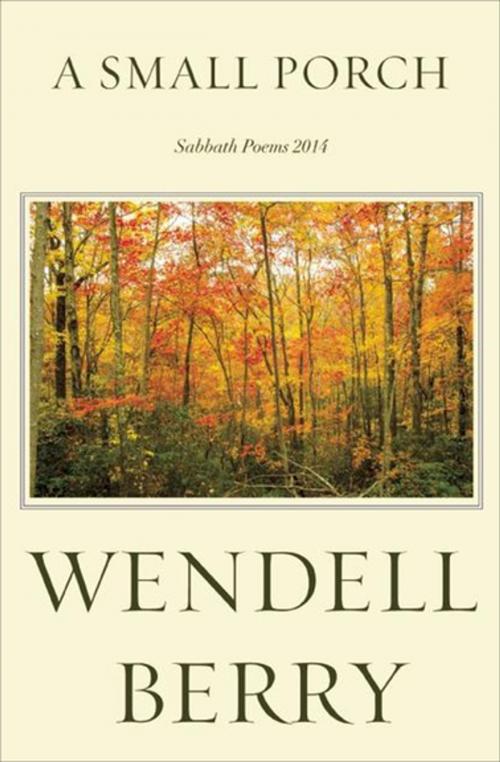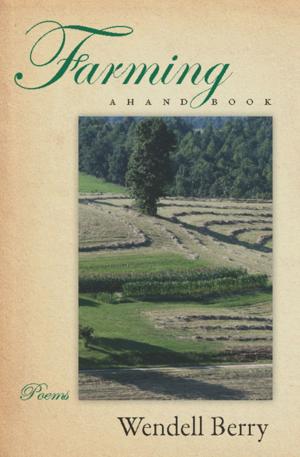| Author: | Wendell Berry | ISBN: | 9781619028036 |
| Publisher: | Counterpoint Press | Publication: | June 1, 2016 |
| Imprint: | Counterpoint | Language: | English |
| Author: | Wendell Berry |
| ISBN: | 9781619028036 |
| Publisher: | Counterpoint Press |
| Publication: | June 1, 2016 |
| Imprint: | Counterpoint |
| Language: | English |
One of America’s most acclaimed writers continues a yearly tradition of poetry inspired by a profound relationship with the natural world.
For more than thirty-five years, Wendell Berry has been spending his sabbaths outdoors, walking and wandering around familiar territory, seeking a deep intimacy that inspired poems in which “Thoreau would be gratified” (Lexington Herald-Leader). Each year since, he has completed a series of these poems dated by the year of its composition.
In this new sequence, “Berry’s craftsmanship remains impeccable” (Booklist) and “shine with a gentle wisdom of a craftsman who has thought deeply about the paradoxical strangeness and wonder of life” (The Christian Science Monitor). Many of these poems were written on a small porch in the woods, a place of stillness and reflection, a vantage point “of the one / life of the forest composed / of uncountable lives in countless / years, each life coherent itself within / the coherence, the great composure, of all.”
This collection also includes the long essay, The Presence of Nature in the Natural World, in which Berry reflects on more than a half century of reading, to discover and to delight in the poetical, spiritual, and cultural roots of his work. With this long essay appended to these new Sabbath Poems, the result is an unusual book of depth and engagement. A new collection of Wendall Berry poems is always an occasion for celebration, and this eccentric gathering is especially so.
“Wendell Berry is one of those rare individuals who speaks to us always of responsibility, of the individual cultivation of an active and aware participation in the arts of life, be they those of composing a poem, preparing a hill for planting, raising a family, working for the good of oneself and one’s neighbors, loving.” —The Bloomsbury Review
“[Berry’s] poems, novels and essays . . . are probably the most sustained contemporary articulation of America’s agrarian, Jeffersonian ideal.” —Publishers Weekly
One of America’s most acclaimed writers continues a yearly tradition of poetry inspired by a profound relationship with the natural world.
For more than thirty-five years, Wendell Berry has been spending his sabbaths outdoors, walking and wandering around familiar territory, seeking a deep intimacy that inspired poems in which “Thoreau would be gratified” (Lexington Herald-Leader). Each year since, he has completed a series of these poems dated by the year of its composition.
In this new sequence, “Berry’s craftsmanship remains impeccable” (Booklist) and “shine with a gentle wisdom of a craftsman who has thought deeply about the paradoxical strangeness and wonder of life” (The Christian Science Monitor). Many of these poems were written on a small porch in the woods, a place of stillness and reflection, a vantage point “of the one / life of the forest composed / of uncountable lives in countless / years, each life coherent itself within / the coherence, the great composure, of all.”
This collection also includes the long essay, The Presence of Nature in the Natural World, in which Berry reflects on more than a half century of reading, to discover and to delight in the poetical, spiritual, and cultural roots of his work. With this long essay appended to these new Sabbath Poems, the result is an unusual book of depth and engagement. A new collection of Wendall Berry poems is always an occasion for celebration, and this eccentric gathering is especially so.
“Wendell Berry is one of those rare individuals who speaks to us always of responsibility, of the individual cultivation of an active and aware participation in the arts of life, be they those of composing a poem, preparing a hill for planting, raising a family, working for the good of oneself and one’s neighbors, loving.” —The Bloomsbury Review
“[Berry’s] poems, novels and essays . . . are probably the most sustained contemporary articulation of America’s agrarian, Jeffersonian ideal.” —Publishers Weekly















